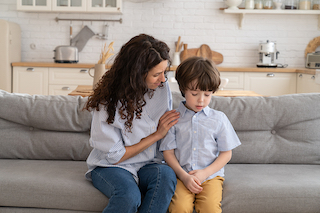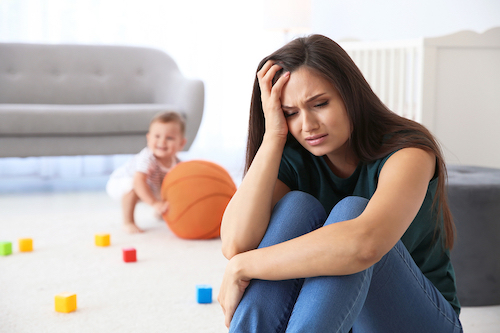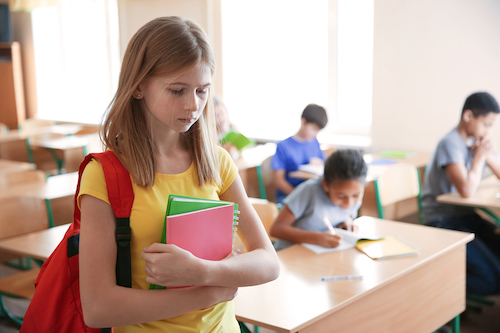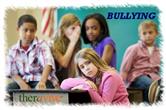November 23, 2021
by Patricia Tomasi

Depression is the leading cause of disability worldwide and it is well known that there are strong links between parental and child depression. Understanding this relationship is key to trying to prevent intergenerational transmission. Worldwide, one in five women suffers from postpartum depression. A new study published in BJPsych looked at maternal and paternal depression and child mental health trajectories. “Our study is about tracking mood over time in children of parents who were depressed in pregnancy and/or after birth,” study author, Professor Rebecca Pearson of Manchester Metropolitan University/University of Bristol told us.
[More]
March 23, 2020
by Elizabeth Pratt

Children who blame themselves for their mothers being unhappy are more likely to experience depression and anxiety.
[More]
August 11, 2018
by Elizabeth Pratt

Back to school time can bring mixed emotions for students and parents. But for some kids, nerves about back to school can be due to something much more serious.
[More]
March 17, 2015
by Mary Horn, Psy.D.

American youth are growing up in a society where competition and the pressure that comes with it, begin at the very beginning of their life experiences. It is not uncommon for parents to go to classes, read books, do research, and gather as much information as they can about parenting. Well-meaning parents want the best for their children. There are programs for babies to read, infants to swim, even sports that begin in toddlerhood. Often, parents will pick homes in good school districts so they can ensure a good education for their children.
[More]
October 12, 2013
by Ashley Marie

Breast cancer can touch anyone. Here is a story of love and courage in the face of this struggle.
[More]
August 30, 2013
by Cindy Marie Hosszu

Back to School Series:
Bullying and being bullied is not a part of growing up. Bullying is not “kids being kids.” Being bullied is not a rite of passage. Over time, psychologists have come to understand just how damaging bullying behaviors can be to children, and into adulthood.
Kids who are bullied are more likely to experience depression, anxiety, sadness, loneliness, changes in sleep and eating patterns, loss of interest in activities previously enjoyed, health complaints, and decreased academic achievement. A small percentage of those bullied may retaliate in violent ways. Twelve of fifteen school shooting cases in the 1990’s involve those who had a history of being bullied.
Kids who bully others can have troubles such as adolescent alcohol and drug abuse, vandalism, fights, drop out of school, engage in early sexual activity, criminal convictions, and can be abusive toward partners, spouses, or children later in life.
Even those who witness bullying can suffer consequences such as use of tobacco, alcohol, and drugs, increased mental health problems such as depression and anxiety, and missed school.
What is Bullying?
Bullying is unwanted aggression that encompasses an imbalance of power, and is repeated over time.[1] It can happen anywhere, and at any time. Whether it is before, during, or after school, the playground, in transit to school, or even on the internet, it affects the person being bullied, the person engaging in bullying, and those who witness the behaviors. In 2011, 20% of 9-12 grade students were bullied nationwide. [2]
Types of Bullying
Verbal - Teasing, name-calling, inappropriate sexual comments, taunting, and threats to cause harm.
Social Bullying - Purposely excluding, encouraging others to exclude, rumors, and public embarrassment.
Physical Bullying - Hitting, spitting, tripping, taking or breaking another’s things, mean or rude hand gestures.
Kids Who Use Bullying Behavior
Risk – Although there is no consistent distinction for people who use bullying behaviors, some of the characteristics that are observed most in those who use bullying is that they tend to be well connected to peers, have social power, or are overly concerned with popularity. They tend to dominate or take charge of others. They can be aggressive, competitive, and easily frustrated, have less parental involvement, or issues at home. They have difficulty following rules, view violence in a positive way, think badly of others, and have friends who bully. They are not stronger physically, but have power over those they bully.
Warning Signs - Those who use bullying behavior may get into physical or verbal fights. They are increasingly aggressive, and may get sent to the principal’s office or detention frequently. You may notice they have friends who bully others. You may notice unexplained belongings or money, and they tend to blame others for their problems, and don’t take responsibility for their actions.
Support - While it is important not to call the person a bully, the child needs to understand that bullying behavior is wrong. Calling one a bully implies that the behavior cannot be changed, and it also fails to recognize that kids can be more than just a bully. They could have been bullied, or witnessed bullying also. While addressing bullying, model respectful behavior, because children learn by example. It is important to show kids that bullying will not be tolerated. Work with the child to understand some of the reasons they are bullying. It can be to fit in, or because they are acting out. Use consequences to teach how bullying is wrong, and build empathy to help prevent future bullying. Talk about what it is to be a good friend, the benefits of teamwork, the importance of respecting others. A project such as Civil Rights and Bullying is an example of a consequence that will build empathy. Involving the child in making amends, such as writing an apology letter, can help the child reflect on how their actions affected another.
Avoid the “Three strikes, you’re out” response, and suspending. They do not reduce the behaviors. Conflict resolution and peer mediation also do not work. It is not a conflict between people of equal power who share equal blame. Group treatment for students who bully does not work because group members tend to reinforce bullying behavior.
Remember to stay involved. Continue to encourage behavior that affects people in a positive way.
Kids Who Are Bullied
Risk – Kids who are bullied need help learning how to respond to being bullied. Like those who bully, there is no specific set of characteristics that describes who is at risk, but they are often perceived as different. They may be overweight, underweight, have different styles, or social standing. They are perceived as weak or unable to defend themselves. They can be depressed, anxious or have low self-esteem. They are usually less popular, or have fewer friends. They do not always get along with others, and may seem “annoying” or attention seeking as they struggle to fit in.
Warning Signs – Sometimes there are no warning signs, and kids do not like to talk about their situation. Some things to look for are changes in the child such as unexplainable injuries, lost or broken belongings, and frequent illness. You may notice changes in eating habits such as not eating, or being very hungry when they get home from school because they did not eat their lunch. They may not want to go to school and have declining grades, loss of interests, loss of friends, and want to avoid social situations. You may notice feelings of helplessness, decreased self-esteem, or self-destructive behaviors.
Support – Listen and focus on the child. Learn what is going on, and show you want to help. Assure the child that bullying is not their fault. Because they may struggle to talk about it with parents, seeking a therapist or councilor may be valuable. Use role play to help give the child way to deal with bullying. Work with the school, and make a game plan and find out what will help the child feel safe. Minimize changes to routine, so that the child is not singled out. If seating changes are necessary, make the change for everyone.
Never tell the child to ignore the bullying. Do not blame the child for being bullied. They did not provoke or deserve the aggressive behavior. Do not tell the child to fight back. Parents should resist the urge to contact other parents because it could make matters worse. Bullying is repetitive behavior, so be persistent and keep informed on the situation.
Witnesses
Those who assist do not start the bullying, but they encourage, or join in at times. Kids who reinforce are not directly involved, but give audience by laughing or encouraging the bullying behavior. Outsiders are kids who remain separate from the bullying and do not either engage or stop it. They often want to help, but do not know what to do. Kids who defend will comfort the child being bullied and may come to the child’s defense.
Prevent Bullying
Talk to kids about bullying. Encourage kids to do what they love. Help kids understand what bullying is and that it is not acceptable. Be a model of kindness and respect. Encourage kids to speak to a trusted adult if they are being bullied, or see others being bullied. Talk about how to stand up to kids who bully such as using humor, or saying “stop” directly and confidently. Talk about actions that don’t work like walking away. Discuss strategies for staying safe such as staying near adults or groups of other kids. Urge them to help kids who are bullied by showing kindness or getting help.
Getting Help
There are times when Bullying can get to a point where depression or stress has set in and a child will benefit from counseling. It may be helpful for the child to talk through the feelings they experiences as well as learn new skills such as assertiveness or self-esteem. Family counseling can also help as this can help to strengthen the child's sense of support, can open lines of communication and increase cohesiveness in a family.
___________________________________________________________________________________________________________
[1] "APA Resolution on Bullying Among Children and Youth." American Psychological Association (APA), July 2004. Web. 20 July 2013.
[2] "Bullying: What You Need to Know | StopBullying.gov." Home | StopBullying.gov. n.d. Web. 20 July 2013.
[3] http://www.dosomething.org/tipsandtools/11-facts-about-school-bullying
In a matter of minutes, an entire community can be devastated by forces they cannot control. Whether it is natural or manmade, disasters are traumatic, and nearly everyone who experiences this kind of stress will need help coping with what they have experienced.
Traumatic Stress
Different types of natural disasters present different stress varying by how close the person is to the event. In some cases people will have trauma from loss, while others may feel guilt because they survived. Females tend to be more susceptible to trauma, but children and the elderly are the most susceptible to serious trauma. In all causes, the experience is an unexpected perceived brush with death.
Hurricanes- While hurricanes come with some warning, they also present stress in the wait to see if or where it will strike. This gives some preparation time, and time to gather things that are important, but extreme weather conditions such as thunder, lightning, rain and wind trigger panic reactions. People are left exhausted, and may suffer survivor guilt, and loss, in addition to injury.
Earthquake- Earthquakes are unpredictable, and do not have a defined end due to aftershocks. Lack of control combined with the fear of another quake can cause a person to have a heightened sense of fear. Sights and smells keep the person in a constant reminder state.
Tornado- Tornadoes give little to no time to prepare. For those who take refuge, not knowing what is happening, while hearing the sounds of destruction around them with no control over their situation is terrifying. Confusion is common. Destruction, sights and smells linger long after. In addition to loss, survivors may feel survivor guilt.
Flood- With floods come desolation of land. A sense that the earth is one thing that is stable is lost. Smell of wet, cold, mud and seeing the devastation of landscapes as well as infrastructure leaves an unstable feeling. Floods do not recede quickly, and cleanup may take a long time, creating exhaustion.
Wildfires- While fires often come with some warning, wind can change the course, and so many are unsure during the wait. Fire does not just ruin things, or remove them, it consumes them. Entire neighborhoods and communities can turn to ash, leaving people misplaced and vulnerable. [1]
Violence- Manmade disasters are unexpected, unfamiliar, and uncontrollable. For those who experience violence at the hands of another human being, trust in others can be lost, leaving them feeling unsafe, vulnerable, and often times, angry with a feeling that it should have been prevented. People may experience nightmares, and be reminded of their grief by seeing upsetting images, and experience upsetting thoughts for some time.
Consequences of Traumatic Stress
It is important for those who have experienced traumatic stress to understand that some of the feelings they experience are normal, and expected. The time it takes to see resilience will vary with the individual. Some common responses to traumatic stress may include:
Uncertainty- Mental and physical exhaustion, shock, disbelief, fear, helplessness, feeling a lack of control, loss of property, loved one, mementos, and income may result in feeling lost or numb. Pre-existing stresses resurface, or seem larger. Anniversaries of traumatic events may trigger the same feelings. Anger at God or others that the survivor may feel were responsible may also cause guilt.
Physical- Responses such as headaches, nausea, chest pain, and sleeplessness are common.
Relationship changes- Relations become tense, routines disrupted, and fear in losing loved ones may cause clinging in children, and tension in adults. Children may not fully understand what happened, and are put in a more responsible role. With their parents upset, children may feel they are still not safe. Children may feel lack of attention due to attention being placed on clean-up/repair. Parents may feel protective of their children and how they are processing the event.
Teens may revert to younger behavior.
Older people, who may suffer from previous health concerns, or have trouble hearing or seeing, may feel incompetent or a burden to the situation.
Work- Increased stress and disruptions in routines results in fatigue, inattention, conflict with others, reduced time available, reduced wages.
Financial- Destruction will change the standard of living. Unpaid bills may cause frustration and seeking financial assistance can add more stress. The financial burden for someone who was financially secure prior to the event will be less than for someone who was already burdened prior to the event.
First responders- While working long hours under intense stress over time, first responders witness human harm, and destruction. They may have their own injuries, depression, and PTSD. [2]
Resilience factors
Social support- Those who have communication and a culture of understanding tend to move more quickly toward emotional resilience.
Coping confidence- Sometimes knowing you will be ok, and that you can do it makes it easier to cope.
Hope- Looking at a positive future, and being able to see better things to come can make an impact on how the future will be for the survivor, and how quickly they feel better.
Therapy focuses on the resilience factors for those who feel overwhelmed by traumatic stress.
________________________________________________________________
[1] Lazarus, P. J., & Jimerson, S. R., Brock, S. E. (2002). Natural Disasters. In S. E. Brock, P. J. Lazarus, & S. R. Jimerson (Eds.), Best Practices in School Crisis Prevention and Intervention (pp. 435-450), Bethesda, MD: National Association of School Psychologists and other crisis information posted on the NASP website at www.nasponline.org.
[2] "Coping With a Traumatic Event." Emergency Preparedness and Response. CDC, 12 June 2003. Web. 06 July 2013
August 4, 2011
by Christie Hunter

By Tanya Glover
Theravive.com Contributor
Once upon a time divorce was a very ugly and taboo word. Back in the 1950’s and 1960’s the word divorce was only whispered and a woman who was divorced was looked upon in a less then favorable light. You could sometimes overhear someone talking in hushed tones about the divorcee who just moved in next door and what type of person she must be. Now, however, we live in a completely different world where divorce is a common word. It is no longer frowned upon (depending on one’s culture or religion) and often filed for. We all know someone who has been through a divorce and it is apparent that it can be a painful process for both husband and wife. But, and unfortunately so, the people who suffer the most when a marriage ends are the children that the marriage produced. As consenting adults, we have the choice of terminating our marriages and moving on. We can kick and scream or laugh and celebrate but in the end, it is our children who are heartsick over the loss of their comfort zone of family. Divorce is a part of life. It is a personal choice and one that in some cases cannot be avoided. However, as the adults it is our responsibility to make sure that our children have the coping mechanisms and support they need to get through this tough time in their lives.
Mommy/Daddy, is it my Fault?
This is a question that is on the minds of the majority of children whose parents divorce. A child’s world is limited to a certain extent. Children, especially young children, have a limited ability to think outside the box. They are not aware of mommy’s temper problems or daddy’s extramarital affair. All that they know is that there is tension and in many cases loud arguments. Not being able to reach out their minds to larger problems they begin to search within themselves for answers. Typically the question they pose to themselves is “what did I do wrong?” Maybe they think that the fact that they got a bad grade or that they have been being naughty a little too often lately has caused daddy to move out of the house. Maybe they think “I have been so bad that Mommy does not want to take care of me anymore so she left.” This is the most common train of thought for a child whose family is breaking up. The fact that is it common does not make it any easier and it is the parents job to make sure that the child does not think that their marital problems have anything to do with them. Talking honestly (Not too honestly though. You do not want to tell little Johnny that you are divorcing because daddy likes his secretary too much.) to your child about divorce is the first step in helping them cope with the new and scary change in their lives. Try telling the child that sometimes when mommies and daddies cannot get along they have to live apart from each other. Let them know that the problem is with their relationship and not with the child and that they love them very much even if they do not love each other anymore. Make sure the child knows that the door is always open for conversation about the divorce and other changes that are coming their way and that both mommy and daddy will be there to help them.
Will I Still Get to See Mommy/Daddy?
With divorce come some heavy changes for the child. Maybe daddy is moving out or maybe the child is moving to a new home with mommy. No matter what the plans for living arrangements are it is important for the child to have a place to feel safe and loved. No matter what the reason for the divorce (short of one spouse being dangerous or abusive) the child should be assured that they will have access to each parent no matter what. It is understandable that a couple that is divorcing would rather not be in the same room together and often there is fighting (in or out of court) about child custody. Any of this should be taken care of out of hearing range of the child. There is enough stress on a small body without adding more to worry about. Ideally, the parents should muster up enough maturity to be able to come up with a custody plan that is in the best interest of the child even when the thought of revenge (using the child as emotional bullets) is so very tempting. With divorce comes anger and sometimes mommy and daddy will be available to them always and just because they do not all live together does not mean they are not a family anymore. If the child wants to see or talk to the absent parent, allow it even if it is not their day for visitation. A little compassion will go a long way in making the child feel that they have some control of the situation.
A Little Love Goes a Long Way
When a child experiences the effects of divorce there are feelings of confusion, stress, anger, and loss. When children feel these things a little love can go a long way. Saying I love you to your children freely and often. Make it easy for them to believe that things can be okay again. The child needs to know this from both parents. Not hearing it can lead to the faulty belief that things happened the way they did because of them. Love also includes allowing the child to love and miss the absent parent. Never speak badly about the other parent in front of the child. The aim here is to make the child comfortable and happy. Hearing negative things that have nothing to do with them only serves to make then confused and question the love of the other parent. It is fine for mom and dad to dislike each other. It is fine for mom and dad to trash each other to friends and other family members. It is not fine for the child to hear what a no good such and such their father or mother is. Once the child hears these types of things it can give them the feeling that they have to take sides in the divorce and this leads to more stress. If the child feels they have to choose sides they will spend time worrying about the parents side they did not choose and if that parent is now angry with them. None of this is the child’s place in the family relationship and they should never be put in such a position.
Coping Through Therapy
Sometimes, love and reassurance is simply not enough to help a child cope with divorce. When it is clear that the child needs more then the parent is able to give it is recommended that therapy be sought. Therapy can be very beneficial to a child who is coping with divorce. While a child’s parents should be their main safe place where they can talk about their feelings and emotion, when a divorce is occurring it can be hard for the child to open up to the parents. This is because the things they are feeling are about their parents and they do not always feel comfortable telling their parents how they feel about things pertaining directly to them. In cases like this, bringing in an unbiased third party can be highly beneficial. Though it may be uncomfortable and scary for the child at the beginning of the therapeutic relationship, after a few sessions the atmosphere becomes more easy going and comfortable and the child finds it easier to open up. The therapist plays the role of trusted confidant and once the child forms this trust with the counselor the healing process can begin. The problems that the child is facing and the emotions they are struggling with can come out into the open and the therapist, getting down to the child’s level, can teach the child how to cope with their feelings. Once the relationship is solidly established there is then the possibility of bringing in the parents, either together or one at a time, to participate in the child’s therapy. This can help the parents become more aware and understanding of the child’s feelings and how they can best help in the healing process. This can also help the child to learn to trust the parents again and feel less like they come from a broken family.
Family is Forever
Divorce is a painful reality in today’s society. Children are affected in different ways then the adults so they require special emotional care in order to gain coping skills and begin healing from the painful reality that has just hit them. Please remember to love your children outwardly and often. Remind them often that there are all different types of families and just because their parents are divorced does not mean that they are no longer a family or that they are loved any less then they were prior to the divorce. Life if forever changing but not all change is bad and this is the lesson that can be gained from this experience.
If your child experiences and suffers with anxiety, it is not only hard for them, but
hard for you t
[More]